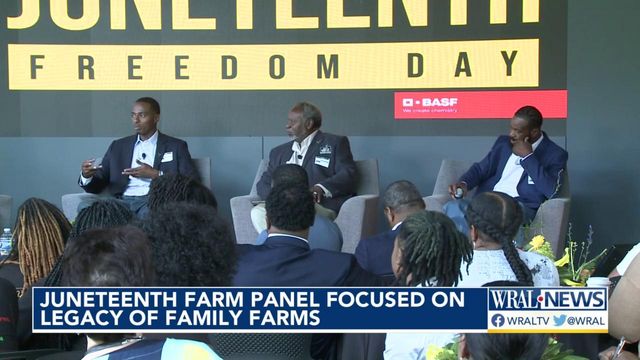Juneteenth farmers panel discusses future of Black growers and their families
A special Juneteenth gathering in the Research Triangle Park (RTP) highlighted the need for more Black farmers.
A panel of growers came to discuss the need to inspire more generations of young Black growers.
"We firmly believe that farming is the biggest job on earth," said Courtney White, head of human resources for BASF in the RTP.
Three men, each with a family legacy of working a farm, discussed what it means to be a Black grower on Monday.
Louisiana farmer Willis Nelson is a third-generation farmer. He said, for his family, it began small.
"We bought our first 55-acre tract, which is still the farm that it’s sitting on which we call the home place," said Nelson.
Now he and his brothers own 300 acres. "And my dad still owns his 150 acres," added Nelson.
He said, "we are successful Black farmers; we’re successful farmers, period."
The panel of growers at the event are all successful, but their numbers are comparatively few. Erin Moore, with BASF explained, "Maybe only 45,000 out of 3.4 million farmers or growers identify as Black."
Others on the panel have successful farms in Kentucky and Mississippi and face the same challenge; that is, attracting their own kids to the family business.
Ronald Bunton of Woodburn, Kentucky said, "when a young person is coming up, you try to introduce them to agriculture at an early age."
Patrick Smith, a farmer in Greenville, Mississippi said, "number one, I want them to go to school and get the best education they can get."
If other plans fail, these growers say the younger generation can always take what they learned in school and use it to help the family businesses.
Smith said, "Things don’t really go well for them, you know, there’s always the farming to come back to to rely on."











